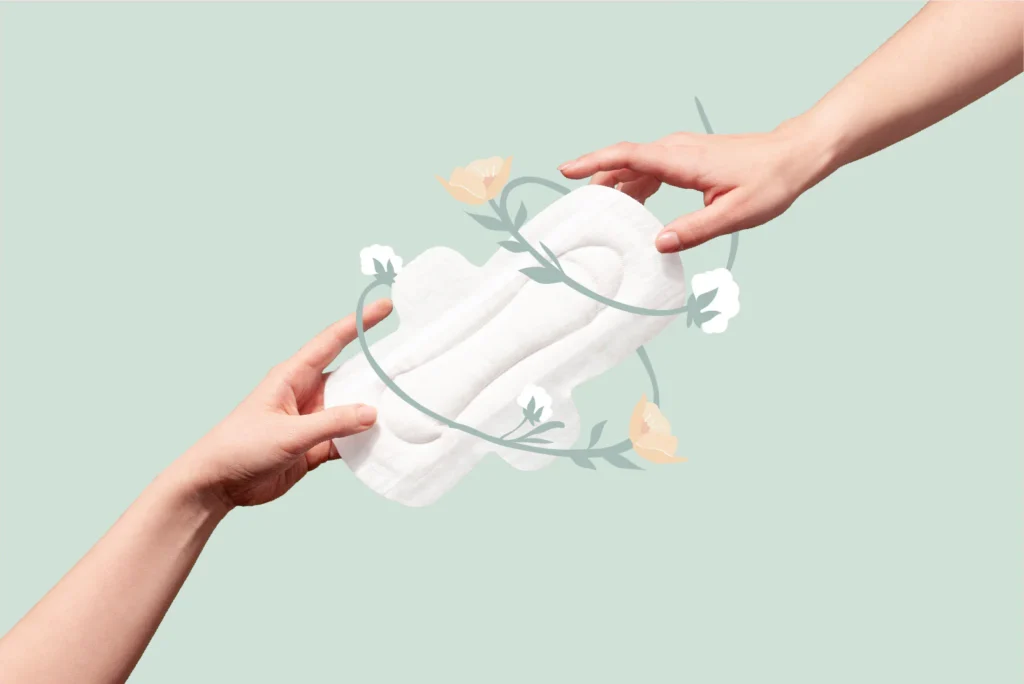Choosing the right menstrual product is a crucial decision for many women, with comfort, health, and environmental impact being top considerations. Over the years, organic menstrual pads have gained popularity as a safer, eco-friendly alternative to conventional pads.
While conventional pads are widely available and often inexpensive, they come with concerns related to chemical exposure and environmental harm. In contrast, organic pads offer several benefits that make them a healthier, more sustainable choice. Here are the advantages of using organic pads over conventional ones.
1. Chemical-Free and Hypoallergenic
One of the most significant benefits of using organic pads is that they are free from harmful chemicals. Conventional pads are often made from synthetic materials such as plastic, rayon, and super-absorbent polymers. To enhance absorbency, conventional pads may also undergo chemical treatments, including bleaching processes that leave traces of dioxins, which are toxic compounds linked to several health issues.
Organic pads, on the other hand, are made from natural fibers, typically 100% organic cotton, which is grown without synthetic pesticides or fertilizers. This reduces the risk of irritation, allergic reactions, or skin sensitivities. For individuals with sensitive skin or who experience discomfort with conventional pads, organic options offer a gentler, hypoallergenic alternative.
2. Reduced Risk of Toxic Shock Syndrome (TSS)
Toxic Shock Syndrome (TSS) is a rare but serious condition associated with the use of highly absorbent tampons and pads, particularly those made with synthetic materials. Although TSS is more commonly linked to tampons, conventional pads made from synthetic fibers can still contribute to bacterial overgrowth and irritation.
Organic pads, being made from natural, breathable cotton, reduce the risk of bacterial buildup that can lead to TSS or other infections. The absence of synthetic materials and chemical treatments in organic pads lowers the chances of creating an environment conducive to bacterial growth, making them a safer option for long-term use.
3. Environmentally Friendly
Conventional menstrual pads are a significant contributor to environmental pollution. Most conventional pads contain up to 90% plastic, which is non-biodegradable and takes hundreds of years to decompose. Additionally, the chemical processes used in manufacturing these pads release harmful byproducts into the environment.
Organic pads are designed with the environment in mind. They are typically made from biodegradable, compostable materials, which means they break down much more quickly and naturally when disposed of. Many organic pad brands also use eco-friendly packaging, reducing plastic waste further. By choosing organic pads, you can minimize your carbon footprint and help reduce the environmental damage caused by conventional menstrual products.
4. Better for Sensitive Skin
For individuals with sensitive skin, menstrual products can sometimes cause itching, rashes, or general discomfort. Conventional pads often contain fragrances, dyes, and other additives that can exacerbate these issues. These added chemicals can disrupt the natural pH balance of the skin, leading to irritation or even allergic reactions.
Organic pads, being free from synthetic fragrances, dyes, and harsh chemicals, are much kinder to the skin. The natural cotton used in organic pads is breathable, allowing for better airflow and reduced moisture buildup, which in turn helps prevent rashes or skin irritation. This makes organic pads an ideal choice for people with sensitive skin or those prone to allergies.
5. Support for Ethical and Sustainable Farming Practices
Organic cotton farming relies on sustainable agricultural practices that avoid synthetic pesticides and chemical fertilizers. This benefits not only the environment but also the farmers and communities involved in cotton production. By choosing organic pads, you are supporting ethical farming methods that promote biodiversity, reduce soil degradation, and avoid harmful chemicals that can leach into water supplies.
Additionally, many organic menstrual pad companies emphasize fair labor practices, ensuring that the people involved in the production process are treated fairly and work in safe conditions. Choosing organic pads, therefore, aligns with a commitment to sustainability and social responsibility.
6. Absorbency and Comfort
Many people assume that conventional pads are more effective at absorbing menstrual flow due to their use of super-absorbent polymers. However, organic pads can be just as absorbent, if not more so, depending on their design and materials. Organic cotton is naturally absorbent and soft, providing comfort without compromising on effectiveness.
In addition to their absorbency, organic pads are often more breathable than their conventional counterparts. This increased breathability helps to reduce moisture buildup and the feeling of discomfort often associated with wearing pads for extended periods. As a result, users can experience a more comfortable menstrual cycle.
7. Reducing Exposure to Endocrine Disruptors
Some conventional menstrual pads contain chemicals like dioxins, phthalates, and BPA, which are known as endocrine disruptors. These chemicals can interfere with the body’s hormonal balance and have been linked to various health concerns, including reproductive issues and certain cancers.
Organic pads do not contain these harmful chemicals, thereby reducing your exposure to endocrine disruptors. For individuals looking to limit their contact with toxic substances, organic pads provide a safer, healthier alternative.
Use Organic Pads
Organic pads offer numerous benefits over conventional menstrual products, from being chemical-free and hypoallergenic to supporting environmentally sustainable practices. With the added comfort, safety, and health benefits, they are an excellent choice for anyone looking to reduce their exposure to synthetic materials and chemicals.
By making the switch to organic pads, you not only take better care of your body but also contribute to a more sustainable future.







